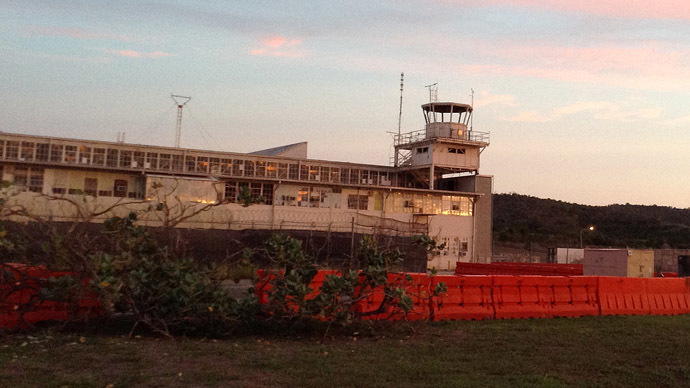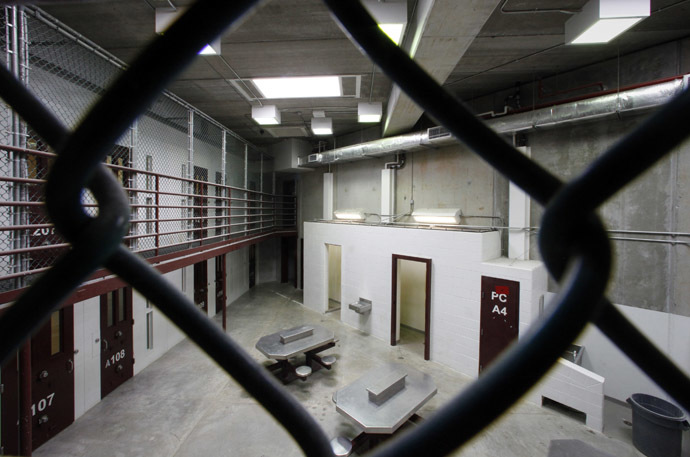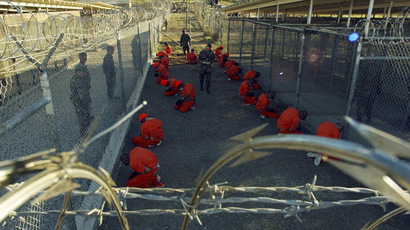US senate paralyzed over Gitmo

The US Senate is seemingly deadlocked when dealing with the Guantanamo Bay detention facility, voting down dueling measures which would have either loosened or tightened restrictions on transferring detainees.
On Tuesday the Senate got to work on the National Defense
Authorization Act (NDAA), which outlines the budget and
expenditures for the Pentagon. Cyber security, sexual assault in
the armed forces and military pay were all on the agenda.
The issue of what to do about the Guantanamo Bay detention facility at the US naval facility in Cuba revealed the long-standing divide within the Senate shows no signs of abating.
The first amendment to the NDAA would have facilitated the Obama
administration's ability to detain and try suspects in the United
States or release them to foreign countries.
The bipartisan measure, proposed by Senators Carl Levin
(D-Mich.), and John McCain (R-Ariz.), fell short of the 60-vote
threshold needed to pass. The vote was 52-46.
McCain read a letter from 38 former US military leaders voicing
their support for the bill. The letter characterized Guantanamo
as a "symbol of torture" and a recruiting tool for
Al-Qaeda.
"I would hope this could be broadly supported," Levin said
before the vote.
Another amendment proposed by Senators Saxby Chambliss (R-Ga.)
and Kelly Ayotte (R-NH) earlier that day would have conversely
restored provisions prohibiting the transfer of detainees to the
United States and made it more difficult to send them abroad.
“Why would we want the most dangerous terrorists in the world
to come to America when we have one of the most secure detention
facilities in Guantanamo?” Ayotte said ahead of the vote.
“We don’t even know where they’ll be brought.”

Ayotte added that senators were failing to look at the long-term
consequences of shuttering Guantanamo, saying that if the
facility were to be closed, the US would not have a suitable
place to carry out prolonged interrogation of high-ranking
Al-Qaeda operatives like Ayman Zawahiri.
That measure was ultimately defeated 43-55, although it gathered
some bipartisan support, with Senators Kay Hagan (D-NC), Mark
Pryor (D-Ark.) and Joe Donnelly (D-Ind.) breaking party ranks to
vote alongside Republicans.
The battle will continue in the House of Representatives,
however, as the restrictions proposed by the Republican senators
were also proposed to the House’s version of the NDAA.
Intransigence on the Senate floor underscores President Obama’s
failure to close the controversial facility for terror suspects
nearly five years after he signed an executive order to shutter
the camp.
Of the 164 terrorism suspects being held at the prison at an
estimated cost of $454 million annually, or about $2.75 million
per person, 84 have already been cleared for transfer.
Nearly 12 years after the camp was created, subsequent
congressional restrictions have all but halted detainee
transfers, leaving many of the men in legal limbo.
Lawmakers opposed to transferring the detainees to US soil have
chosen to present all the detainees as grave threats to national
security.
"The 164 that are remaining are the meanest, nastiest terrorists
in the world, frankly," said Chambliss. "They're the ones
nobody's going to want. So if nobody else wants them, why should
we allow them to come to the United States?"
But while Khalid Sheikh Mohammed, the suspected mastermind of the
September 11 attacks on the United States, is among the 164 being
held at the camp, Democratic Senator Dianne Feinstein noted other
Al-Qaeda members are being held at a maximum security prison in
Colorado for one-thirty-fifth the cost.
In an era of tight budgets, she said, "how can we justify
spending approximately $2.8 million per Guantanamo detainee?"














